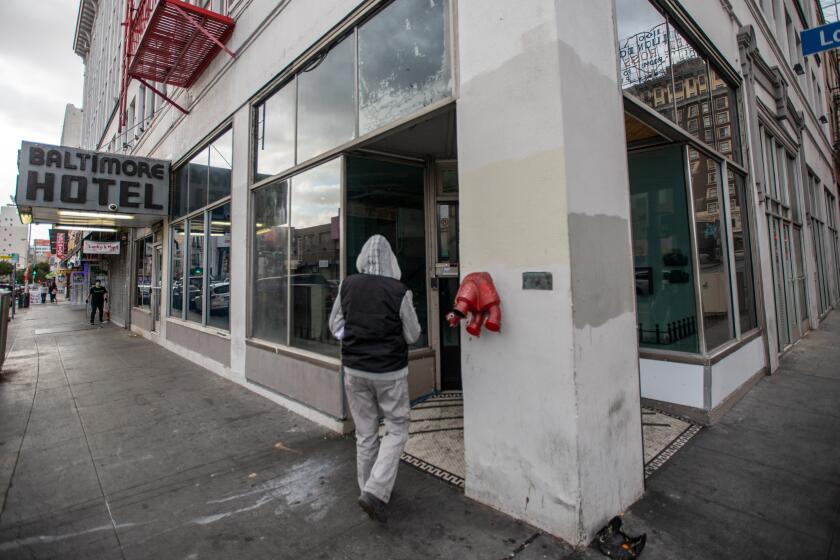Measure on global warming law loses
Californians on Tuesday night were narrowly favoring new rules to make it easier to pass state budgets while rejecting a proposal to legalize marijuana. A push by Texas oil companies to suspend the state’s landmark global-warming law was defeated.
Voters approved a measure to give an independent panel new powers to draw congressional districts, but voted down a proposal for new car fees to fund state parks.
Tens of millions of dollars were spent on a blizzard of television ads, mailers and automated “robocalls” to voters in recent weeks as campaigns scrambled to persuade the public.
Some used Hollywood stars to deliver their messages. Director James Cameron teamed with Gov. Arnold Schwarzenegger to attack the measure to suspend the climate law.
Actress Susan Sarandon filled voters’ voicemails with a pre-recorded plea for legalization of marijuana.
Tuesday’s vote marked the 99th year of direct democracy in California -- power granted to the people to rewrite the state’s laws at the polls.
Conceived as a way to loosen special interests’ stranglehold on Sacramento, placing an initiative on the ballot can cost millions of dollars and is largely the province of the powerful and well-heeled -- the very groups it was designed to counter.
Still, it was California’s voting public that had final say Tuesday, deciding the fate of nine propositions that could reshape the state’s drug, environmental and political laws:
Proposition 19 -- Marijuana
This proposal would have made marijuana use legal in California. Supporters said regulating and taxing the sale of pot would have helped raise money for cash-strapped local governments and save tens of millions of dollars a year on the costs of jailing and supervising marijuana offenders.
The legal age for buying pot would have been 21. Driving under the influence would still have been illegal.
Proposition 20 -- Congressional districts
This proposition will remove from the Legislature the power to draw congressional districts, transferring it to an independent 14-member commission that is already set to redraw lines for state legislative districts next year.
The commission has five Democrats, five Republicans and four members registered with neither party. District lines must be approved by nine members, including three Democrats, three Republicans and three from neither party. The goal of the measure’s promoters is to eliminate gerrymandering -- the creation of politically safe districts.
Proposition 21 -- Car fees
Californians would have been charged a new annual $18 fee for each car they registered under this proposal. The surcharge would have gone to pay for upkeep of state parks and wildlife conservation programs. Vehicles subject to the fee would have received free admission and parking at all state parks. The measure would have generated at least an additional $250 million for state parks and wildlife conservation, according to the nonpartisan Legislative Analyst’s Office.
Proposition 22 -- Local government funds
This measure, approved by voters Tuesday, will bar the state from taking funds from local governments and other local agencies, including regional transportation improvement projects. The measure, championed by the League of California Cities and other local government groups, also will bar the state from delaying the distribution of tax revenue owed to local governments, even during a budget crisis. The California Teachers Assn. and other labor groups opposed the measure, saying it would force cuts in education and other state services.
Proposition 23 -- Global warming
This proposal would have suspended implementation of the state’s landmark global-warming law until unemployment in California dropped to 5.5% or below for a full year, a rare occurrence. Supporters included large oil companies that stand to lose financially from the state’s push toward less-polluting sources of energy. Environmentalists and Gov. Arnold Schwarzenegger opposed it, saying it would set back efforts to curb greenhouse gases in California and elsewhere and undermine growth of the state’s green sector.
Proposition 24 -- Corporate tax breaks
About $1.3 billion in annual corporate tax breaks scheduled to begin taking effect this year would have been rolled back under this measure, which voters rejected Tuesday. The tax breaks were approved as part of the state budget in 2008 and 2009.
Proposition 25 -- State budgets
This proposition would allow the Legislature to pass state budgets with a simple majority rather than the two-thirds vote now required. It would not apply to tax increases, which would still require a two-thirds majority. The proposal also would penalize state lawmakers if they fail to pass a budget by June 15, causing them to forfeit their salaries and expenses for every day they fail to settle on a plan.
Proposition 26 -- State government fees
Voters approved this measure which requires a two-thirds vote, rather than the simple majority now necessary, for the Legislature to pass or raise certain fees for government programs. It also bars local governments from raising some taxes without two-thirds voter approval.
Proposition 27 -- Legislative districts
Voters rejected the measure, which would have voided the independent commission that voters authorized to redraw state legislative boundaries and returned that authority to the Legislature.
The commission has five Democrats, five Republicans and four members registered with neither party. District lines must be approved by nine members, including three Democrats, three Republicans and three from neither party.
--
More to Read
Get the L.A. Times Politics newsletter
Deeply reported insights into legislation, politics and policy from Sacramento, Washington and beyond. In your inbox three times per week.
You may occasionally receive promotional content from the Los Angeles Times.






